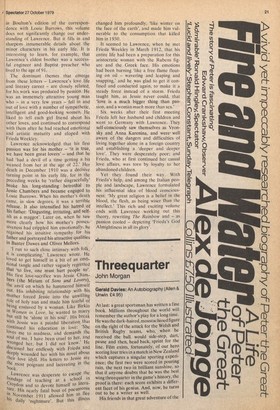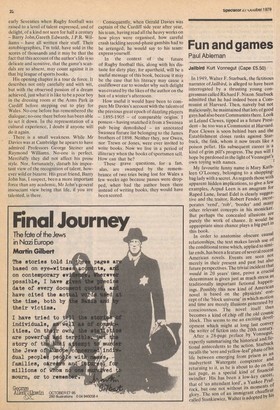Th reeq u a de r
John Morgan
Gerald Davies: An Autobiography (Allen & Unwin £4.95) At last: a great sportsman has written a fine book. Millions throughout the world will remember the author's play for a long time. He was the dark-haired, moustachioed figure on the right of the attack for the Welsh and British Rugby teams, who, when he received the ball. would side-step, dart, pause and then, head back, sprint for the line. Film exists, fortunately, of our hero scoring four tries in a match in New Zealand which captures a singular sporting experience; the first two were scored in pouring rain, the next two in brilliant sunshine, so that if anyone doubts that he was the best wing threequarter in the game's history, the proof is there: each score exhibits a different facet of his genius. And, now, he turns out to be a writer as well.
His friends in that great adventure of the
early Seventies when Rugby football was raised to a level of talent expressed, and of delight, of a kind not seen for half a century — Barry John,Gareth Edwards, J.P.R. Williams — have all written their stuff. Their autobiographies, I'm told, have sold in the scores of thousands and it may be that the fact that this account of the author's life is so delicate and sensitive, that the game's scandals are so absent, may count against it in that big league of sports books.
His opening chapter is a tour de force. It describes not only carefully and with wit, but with the observed passion of a dream achieved, just what it is like to be a poor boy in the dressing room at the Arms Park in Cardiff before stepping out to play for Wales. No-one before has remembered the dialogue; no-one there before has been able to set it down. In the representation of a cultural experience, I doubt if anyone will do it again.
There is a small weakness. While Mr Davies was at Cambridge he apears to have admired Professors George Steiner and Raymond Williams. No-one is perfect. Mercifully they did not affect his prose style. Nor, fortunately, disturb his important view of the recognition of talent, however wild or bizarre. His great friend, Barry John has, I suspect, been a more important force than any academic, Mr John's general insouciant view being that life, if you are talented, is there. Consequently, when Gerald Davies was captain of the Cardiff side year after year, his team, having read all the heavy works on how ploys were organised, how careful crash tackling second-phase gambits had to be arranged, he would say to his team: express yourself.
In the context of the future of Rugby football this, along with his distaste for dirty play, for apartheid, will be a useful message of this book, because it may be the case that his literacy may cause a cauliflower ear to wonder why such delight was created by the likes of the author on the box of a winter's afternoon.
How useful it would have been to compare Mr Davies's account with the talents of the previous great epoch of dazzling players — 1895-1905 — of comparable origins. I possess — having snatched it from a Swansea pub being demolished — an annotated Swansea fixture list belonging to the James brothers of 1898. Neither they, nor Owen, nor Trewn or Jones, were ever invited to write books. Now we live in a period of illiteracy when the books of sportsmen sell. How can that be?
These grave questions, for a fan, alas, are swamped by the remembrance of two tries being lost for Wales a few weeks ago because passes were dropped, when had the author been there instead of writing books, they would have been scored.



































 Previous page
Previous page